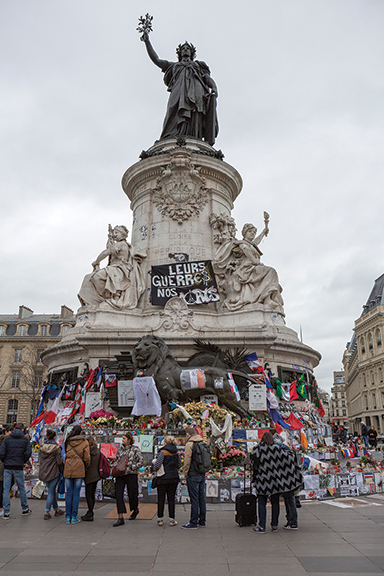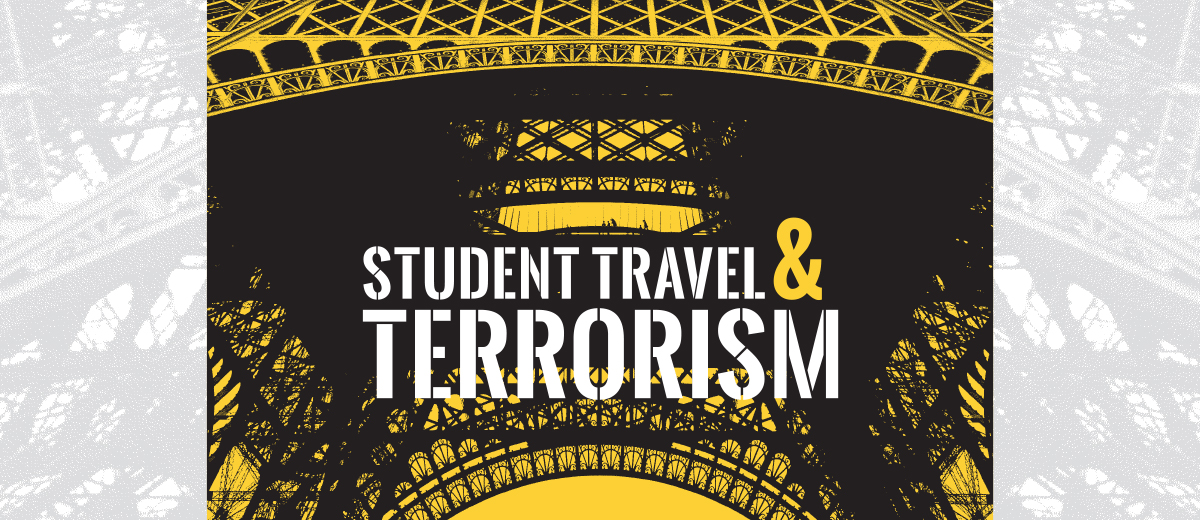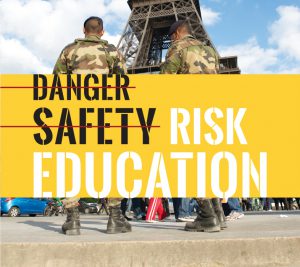By Judy Owen
Duane Brothers is an early riser, but he didn’t have a relaxing morning on March 22.
The superintendent of the Louis Riel School Division was watching the news as part of his get-ready-for-the-day ritual when he saw reports about the 2016 terrorist bombings in the Brussels airport and a metro station in the Belgium capital.
His phone soon rang with a colleague on the other end, making sure he was aware students from Collège Jeanne-Sauvé were supposed to be flying to Europe that day – through the Brussels airport.
“I’m looking at the news and I’m seeing two attacks and I’m hearing news of more attacks taking place beyond those ones,” Brothers says. “Frankly, at that point it was an easy decision for us to make.”
That decision was to cancel the spring break trip.
“We contacted the principal. We heard back about insurance,” Brothers recalls. “The insurer said that as long as the division cancelled the trip, not the school, then there was a high chance they’d be reimbursed.
“So as soon as I got into the office, we drafted a letter and we had a letter to the insurer by about 8:30 in the morning.”
Brothers wasn’t the only Manitoba school superintendent who had to make some quick decisions that day.
St. James-Assiniboia School Division had students from St. James Collegiate and Collège Sturgeon Heights Collegiate at the airport already, waiting to fly to Germany through Brussels. They were sent home. Students from Westwood Collegiate were actually in flight to Brussels when the bombings occurred and were rerouted to Paris.
Students from Oak Park High School in the Pembina Trails School Division were scheduled to leave on a European trip that afternoon, going through Brussels. The trip was cancelled, but the travel company proposed a different trip to Rome. Once things checked out with travel advisories and the insurance company, they left within a couple days. A group from Vincent Massey Collegiate was already in Germany and returned home as scheduled.

Paris, France – January 29, 2016: People mourn and stand in front of the memorial marking the terrorist attacks on 13 November 2015. Place de la Republique became the gathering spot to mourn the loss of life that occurred.
The issue has reverberated across Canada and the world with educators struggling with how best to protect students. Last year three school divisions in Alberta suspended all international trips for the last seven months of the school year.
Plans for student travel in Manitoba continue.
It was a bit of déjà vu for Pembina Trails superintendent Ted Fransen.
In November 2015, seven students and two teachers from Vincent Massey Collegiate were part of a student exchange in private homes in France. They were spending a few days in Paris before returning home, right at the time of co-ordinated terrorist shootings and suicide bombings in a concert hall, stadium and bars and restaurants that left 130 people dead and almost 400 injured.
The students’ activities were limited, partly because Paris was basically in a lockdown, and the group arrived home as planned.
The terrorism and student travel issue has become so significant, the Manitoba Association of School Superintendents put it on its agenda for an October meeting.
The issue has reverberated across Canada and the world with educators struggling with how best to protect students. Last year three school divisions in Alberta suspended all international trips for the last seven months of the school year.
Plans for student travel in Manitoba continue.
With another school year underway, Fransen says the past events haven’t caused Pembina Trails to curb travel.
“We certainly examine every request from a school regarding travel. We examine them carefully,” he says. “There might be a heightened sense of due diligence now.”
Four high schools in the division are planning a trip to Vimy, France, for the 100th anniversary of the Vimy Ridge battle in early April 2017.
Fransen is reviewing those plans for students and staff from Oak Park, Shaftesbury, Fort Richmond and Vincent Massey.
There is increased concern about safety at such a large event that will attract people from around the world.
“We monitor as much as we can and we are prepared to make the decision we made with Oak Park because student safety is first and foremost,” Fransen says.
Students from Lord Selkirk Regional Comprehensive Secondary School also plan to go to Vimy, a trip that’s been approved in principle, says Lord Selkirk School Division superintendent Scott Kwasnitza.
There will be consultations with the tour company, while advice from provincial and federal government authorities will be followed, he says, adding regional superintendents in the southeast Interlake have talked about it at length.
“We never want to put somebody in harm’s way and we’re never going to do that,” Kwasnitza says. “But I think we have to be cautious that we don’t knee jerk and shut all these trips down completely.
“The question really has to be asked, ‘Is the trip worth the effort that it takes? Is the educational component of the trip worthy of the money that you’re spending, the time that you’re dedicating,” Thomas says.
“I think we have always looked at this with an open mind. It would be easy just to say you can’t travel internationally anymore, but that would be a lost opportunity. I think that’s the new reality in 2016 that we face as school division leaders.”
The Selkirk high school had two trips in the past six months. One was to the United Kingdom (England, Scotland, Ireland), right around the time of the Brussels bombings. Another was in July, a group that went on a humanitarian trip to Ecuador. Both excursions went off without a hitch.
Darren Thomas, risk manager for the Manitoba School Boards Association, says he’s there to advise schools because some insurance companies may not cover trips to certain areas.
“Political unrest, natural disaster, common sense tells you not to go to that area,” Thomas says.
The government of Canada’s travel website provides risk advisories for countries around the world.
For example, in mid-September, the advisories for Belgium and France read “you should exercise a high degree of caution due to the current elevated threat of terrorism.” The United Kingdom and Italy were “exercise normal security precautions.”
“The question really has to be asked, ‘Is the trip worth the effort that it takes? Is the educational component of the trip worthy of the money that you’re spending, the time that you’re dedicating,” Thomas says. “Or is there somewhere in Canada or North America that you could go to that may be the equivalent.”
Of course, Thomas and the superintendents know violent or dangerous events can happen anywhere, citing the 2014 shooting at Parliament Hill in Ottawa.
“On a go-forward basis, we believe in European travel. We just simply want to continue to do our due diligence,” says Brothers, adding the division is reviewing the tour and insurance companies it uses because some have different guidelines.
After the Collège Jeanne-Sauvé trip was cancelled, others went ahead, Brothers says. That week, one group flew into Paris, but didn’t leave the airport. They caught another flight to southern France and went to Switzerland.
He knows the Collège Jeanne-Sauvé students, who met that day with school administrators, were disappointed. A meeting for parents was also held that night and they were supportive of the division’s decision.
“They were glad that we made the decision rather than leaving it up to them and having their kids really upset with them, and having some kids that were going and some kids that were not going,” Brothers says.
“Parents get it. They were watching the news as well.”
Fransen had mixed reviews from parents when he made the final decision to cancel the Oak Park trip.
“Some were upset with the division, with me, because it was my decision,” he says. “I consulted, of course, but in the end somebody had to make the decision and that fell to me. So some were upset, some were thrilled. I suspect the ones that I didn’t hear from were in the middle.”
Brothers, Kwasnitza and Fransen welcome the discussion planned by the school superintendents.
“There’s value in sharing lessons learned,” Kwasnitza says. “Any opportunity that we have as superintendents to talk about whether divisions have experienced some of the lessons learned, some of the insights that we gather from hindsight, I think those are great opportunities and a great chance to brainstorm and learn from each other.”
Pharos Response, a critical incident and security company in Britain, issued these suggestions for student travel:
- Consider increasing supervision ratios from normal arrangements. If for example small groups of older students are allowed to spend short periods of time indirectly supervised by staff, consider removing this additional freedom
- Stay alert to local and national news before and during
- Carefully consider the relative benefits of visits to religious or political venues and events that could be considered higher risk
- Communicate openly with customers or parents in advance to reassure them that safety is the priority and has been carefully considered by the organizers. Provide contact details of visit leaders for them to contact during trip
- Remind students to remain vigilant and alert, reporting anything suspicious to leaders
- Brief participants in advance that if they are caught up in a security situation, that they should try and get away as quickly but safely from the immediate vicinity as possible, leaving baggage or other belongings behind
- Brief participants in advance to follow instructions of police or security forces at all times, being mindful that they may be armed and appear more intimidating than they are used to. Officers might be extremely forceful, direct and may even point weapons directly at them and others
- Brief participants what to do if separated from each other in the event of a security incident. This should include designating specified physical meeting points and contact telephone numbers for staff. Remember that mobile phones may not work in the immediate hours after an incident so it is additionally important to designate a meeting location. Consider use of public phones where they still exist for contacting the school or office. Phone networks were blocked by police in London following the 2005 attacks but were deliberately maintained by the French police in Paris November 2015
- Data based communication services such as WhatsApp might work even when voice calls don’t so consider setting up a trip-specific WhatsApp group for communicating in an emergency
- Consider providing all participants with a printed emergency contact card with the school’s or office’s landline telephone number on it and provide space for them to write down their own home landline number
- Leaders should carry a spare mobile phone (if possible on a different telephone network to the other handset) and spare battery or auxiliary charger. Simple items like a notebook, pen and torch can be really useful too
- Each Leader should carry a team list with all participant details, including medical conditions and next of kin noted
- Tell students that if they are separated, to ask for assistance from a police officer or other security official and state that they are a part of a school group. Remind them that police and security forces may be very forceful with the public in the immediate vicinity of an incident: this is necessary until people’s identities are confirmed
- Carry water (not just fizzy drinks!) and snacks on visits in case of travel disruption and long delays, especially in warmer months or climates
- Carry additional personal medication in case of long delays
— Originally published in the Oct-Nov. 2016 issue of The Manitoba Teacher Magazine.


